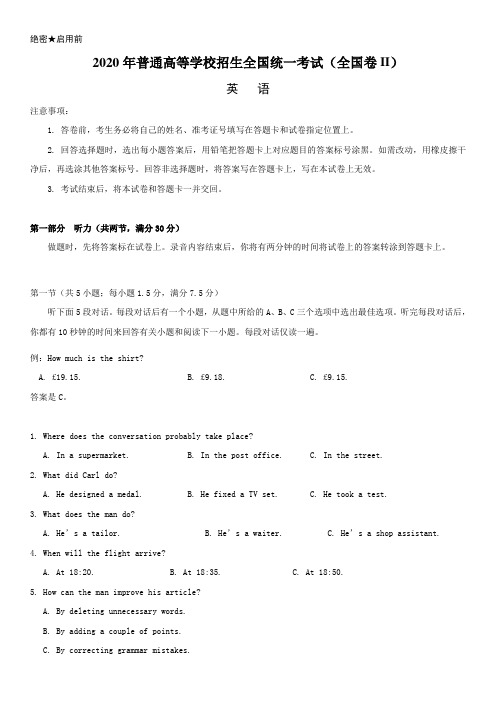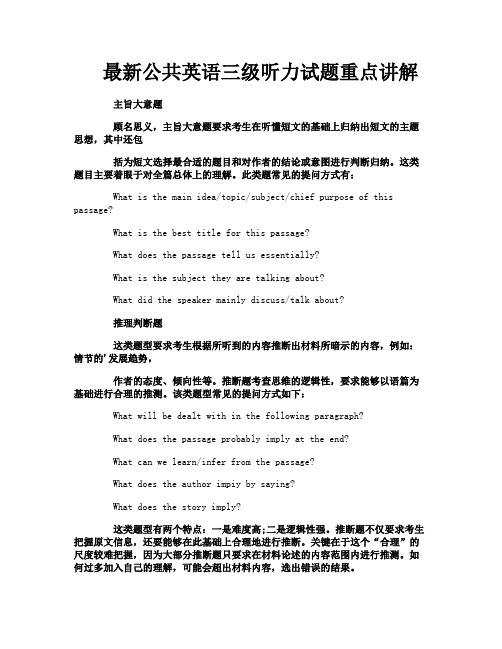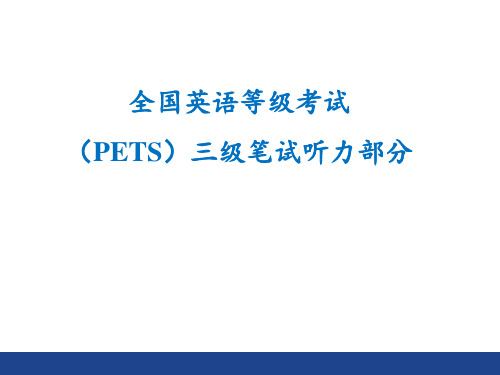2020年全国英语等级考试PETS-3级听力重难点讲解(1)完整篇.doc
2020年全国卷Ⅲ英语听力(含答案+听力原文+听力部分解析)

绝密★启用前2020年普通高等学校招生全国统一考试(全国卷II)英语注意事项:1. 答卷前,考生务必将自己的姓名、准考证号填写在答题卡和试卷指定位置上。
2. 回答选择题时,选出每小题答案后,用铅笔把答题卡上对应题目的答案标号涂黑。
如需改动,用橡皮擦干净后,再选涂其他答案标号。
回答非选择题时,将答案写在答题卡上,写在本试卷上无效。
3. 考试结束后,将本试卷和答题卡一并交回。
第一部分听力(共两节,满分30分)做题时,先将答案标在试卷上。
录音内容结束后,你将有两分钟的时间将试卷上的答案转涂到答题卡上。
第一节(共5小题;每小题1.5分,满分7.5分)听下面5段对话。
每段对话后有一个小题,从题中所给的A、B、C三个选项中选出最佳选项。
听完每段对话后,你都有10秒钟的时间来回答有关小题和阅读下一小题。
每段对话仅读一遍。
例:How much is the shirt?A. £19.15.B. £9.18.C. £9.15.答案是C。
1. Where does the conversation probably take place?A. In a supermarket.B. In the post office.C. In the street.2. What did Carl do?A. He designed a medal.B. He fixed a TV set.C. He took a test.3. What does the man do?A. He’s a tailor.B. He’s a waiter.C. He’s a shop assistant.4. When will the flight arrive?A. At 18:20.B. At 18:35.C. At 18:50.5. How can the man improve his article?A. By deleting unnecessary words.B. By adding a couple of points.C. By correcting grammar mistakes.第二节(共15小题;每小题1.5分,满分22.5分)听下面5段对话或独白。
最新公共英语三级听力试题重点讲解

最新公共英语三级听力试题重点讲解主旨大意题顾名思义,主旨大意题要求考生在听懂短文的基础上归纳出短文的主题思想,其中还包括为短文选择最合适的题目和对作者的结论或意图进行判断归纳。
这类题目主要着眼于对全篇总体上的理解。
此类题常见的提问方式有:What is the main idea/topic/subject/chief purpose of this passage?What is the best title for this passage?What does the passage tell us essentially?What is the subject they are talking about?What did the speaker mainly discuss/talk about?推理判断题这类题型要求考生根据所听到的内容推断出材料所暗示的内容,例如:情节的'发展趋势,作者的态度、倾向性等。
推断题考查思维的逻辑性,要求能够以语篇为基础进行合理的推测。
该类题型常见的提问方式如下:What will be dealt with in the following paragraph?What does the passage probably imply at the end?What can we learn/infer from the passage?What does the author impiy by saying?What does the story imply?这类题型有两个特点:一是难度高;二是逻辑性强。
推断题不仅要求考生把握原文信息,还要能够在此基础上合理地进行推断。
关键在于这个“合理”的尺度较难把握,因为大部分推断题只要求在材料论述的内容范围内进行推测。
如何过多加入自己的理解,可能会超出材料内容,选出错误的结果。
练习:Questions 1~4 are based on a short story.1. How do the housewives learn about the offer of free groceries?[A] On the radio. [B] At the supermarket.[C] From the manager. [D] From their friends.2. What did Mrs. Edwards want very much?[A] Get a basket of free goods. [B] Meet the manager.[C] Get a free basket. [D] Fill all her cupboards.3. Why did Mrs. Edwards go back to the supermarket after she had finished shopping one day?[A] Because she had to meet the manager.[B] Because she had to buy one more thing.[C] Because she had to find her shopping.[D] Because she had to pay for her shopping.4. Which of the following words best describes Mrs. Edwards feeling at the end of this story?[A] Embarrassed. [B] Disappointed.[C] Delighted. [D] Proud.听力原文All the housewives who went to the supermarket had one great ambition: to be the lucky customer who did not have to pay for her shopping. For this was what the notice just inside the entrance promised. It said:“Remember, once a week, one of our customers gets free groceries. This may be your lucky day!”For several weeks Mrs. Edwards hoped, like many of her friends, to be the lucky customer. Unlike her friends, she never gave up hope. The cupboards in her kitchen were full of things, which she did not need.In vain her husband tried to dissuade her. She dreamed of the day when the manager of the supermarket would approach her and say:“Madam, thisis your lucky day. Everything in your basket is free.”One Friday morning, after she had finished her shopping and had taken it to her car, she found that she had forgotten to buy tea. She dashed back to the supermarket, got the tea and went towards the cash desk. As she did so, she saw the manager of the supermarket approach her. “Madam,” he said, holding out his hand,“I want to congratulate you! You are the lucky customer and everything in your basket is free! ”答案:1.B 2.A 3.B 4.B。
2020全国卷三英语听力

2020全国卷三英语听力Part I:Section A (11 questions)1. W: Look! There's a sale on winter clothes. Let's go andget some for ourselves.M: Oh, it's too early to think about that now. The weather is still warm.2. W: Why do you take a lot of pictures when we go on vacation?M: That is the only way I can remember what we did in our trips.3. W: Mary is still at home after graduation.M: I thought she had decided to move out and find a job.4. M: Passengers flying to New York are requested to check in at Gate 8.W: What time does the flight leave?5. W: Excuse me. Can you tell me how to get to the pet store? M: Sure. Take the bus to Main Street and walk two blocks south.6. W: People these days don't seem to care about where their food comes from.M: It's true. They care more about how it tastes than whereit comes from.7. W: I heard you failed your driving test.M: Yeah, I made too many mistakes.8. W: Have you told your parents that you're planning to takea gap year?M: Not yet. I'm a little bit scared about their reaction.9. M: Let's take a look at the options for the summer camp. W: OK. It says here that registration will start in two weeks.10. W: Did you know that Mark's been trying to lose weightfor a few months?M: Yeah, he's been exercising every day and eating healthier.11. W: Do you think there will be a lot of people at the concert tonight?M: Most likely. The tickets sold out very quickly.Part II:Section A (6 questions)1. W: The job sounds great. When do you need me to start work? M: As soon as you're ready. We can start the training next week.2. M: I heard you got an internship with a big company this summer.W: Yes, I'm excited. I start in two weeks.3. W: So when did you first realize you wanted to become a doctor?M: When I was in high school, my biology teacher inspired me.4. M: Your phone has been ringing for the past five minutes. W: Oh, that must be my mother. She probably forgot something again.5. W: What kind of classes will you be taking next semester? M: I'm not sure yet. I'm thinking about taking a few biology classes.6. W: How often do you go to the movies?M: Usually once a month. But sometimes I go more often.Part III:Section A (5 questions)1. Narrator: The manager of a fast-food restaurant waslooking for ways to increase sales.He decided to offer discounts for large orders.2. Narrator: For the last two weeks, the number of customers coming to the restaurant had decreased significantly.The manager wanted to find out why this was happening.3. Narrator: He conducted a survey among customers and found out that most of them were not happy with the quality of the food.So, he decided to improve the quality of the ingredients.4. Narrator: The manager also noticed that some of his employees were not very friendly or helpful.So, he held a training session and reminded them of the importance of good customer service.5. Narrator: After making these changes, the manager saw an increase in sales and customer satisfaction.He realized that customer feedback was important.。
公共英语三级PETS3级听力讲义

全国英语等级考试(三级)PETS-3听力精讲新世纪教育公共英语三级(pets3)包过 q17951073主讲人:张志健目录一、题型概述二、A 节短对话三、B节长对话、短文四、复习指导一、题型概述听力部分大纲要求与考查点大纲要求考查点理解主旨要义;考查对文章大意和中心思想的理解能力;获取事实性的具体信息;考查从听力材料中获取事实细节的能力;理解明确表达的概念性含义;考查根据听力材料内容提炼并理解概念、定义等的能力;进行有关的判断、推理和引申;考查在理解听力材料的基础上,对说话人的身份、职业、与对话人的关系、事件发生的地点和时间等进行判断、推理和引申的能力;理解说话者的意图、观点或态度。
考查分析说话者措辞、语气和语调,推断说话者的意图、观点或者态度的能力。
⏹题目数量15道题,4段长对话或者短文⏹篇幅时间总长800词,每段平均约200词,持续8'30″⏹所占分值15分⏹答题要求每题有15秒答题时间(5秒用作听前读题,10秒用作听后答题)。
每段录音材料只播一遍。
Section IListening☐题目数量10道题,10段短对话☐篇幅时间总长400词左右,约3'30″☐所占分值10分☐答题要求每题有15秒答题时间(5秒用作听前读题,10秒用作听后答题)。
每段录音材料只播一遍。
A 节短对话B 节长对话、短文二、A节短对话提问方式通常为以What, When, Where, Why, Who,How等开头的特殊疑问句,如:What is the woman doing at the moment?When will the bank open on Sundays?Where is the man`s house located?Why is the woman angry with her son?How does the man feel about his grade?问题类型是什么?什么时间?什么地点?谁?什么原因?什么态度?……行为内容题(what)、时间数字题(when)、场所地点题(where)、职业身份题(who)、原因动机题(why)、态度立场题(how)短对话的“潜规则”1. 推理原则一般情况需要对对话进行推理,因此在短对话中,“所听非所得”。
2020年普通高等学校招生全国统一考试(英语全国卷III)(word附答案)

绝密★启用前2020年普通高等学校招生全国统一考试(全国卷III)英语注意事项:1. 答卷前,考生务必将自己的姓名、准考证号填写在答题卡和试卷指定位置上。
2. 回答选择题时,选出每小题答案后,用铅笔把答题卡上对应题目的答案标号涂黑。
如需改动,用橡皮擦干净后,再选涂其他答案标号。
回答非选择题时,将答案写在答题卡上,写在本试卷上无效。
3. 考试结束后,将本试卷和答题卡一并交回。
第一部分听力(共两节,满分30分)做题时,先将答案标在试卷上。
录音内容结束后,你将有两分钟的时间将试卷上的答案转涂到答题卡上。
第一节(共5小题;每小题1.5分,满分7.5分)听下面5段对话。
每段对话后有一个小题,从题中所给的A、B、C三个选项中选出最佳选项。
听完每段对话后,你都有10秒钟的时间来回答有关小题和阅读下一小题。
每段对话仅读一遍。
例:How much is the shirt?A. £19.15.B. £9.18.C. £9.15.答案是C。
1. Where does the conversation probably take place?A. In a supermarket.B. In the post office.C. In the street.2. What did Carl do?A. He designed a medal.B. He fixed a TV set.C. He took a test.3. What does the man do?A. He’s a tailor.B. He’s a waiter.C. He’s a shop assistant.4. When will the flight arrive?A. At 18:20.B. At 18:35.C. At 18:50.5. How can the man improve his article?A. By deleting unnecessary words.B. By adding a couple of points.C. By correcting grammar mistakes.第二节(共15小题;每小题1.5分,满分22.5分)听下面5段对话或独白。
全国英语等级考试(PETS)三级笔试听力部分

职业 请求 观点 场所 时间 因果 行动 分析 身份 建议 态度 地点 数字 关系 计划 推理
5
5 11 9 10 22 20 43
由上表我们可以很容易看出,PETS第三级考试听力部分 主要考查这几种题型:职业身份题、请求建议题、观点态 度题、场所地点题、时间数字题、因果关系题、行动计划 题和分析推理题。
you? W: I couldn't come, Mr. Hart. I hurt my foot, and my mother
took me to the doctor. Q: What is the probable relationship between the two speakers?
【分析】从第一位说话人 “You were absent from class yesterday”, 我们可以推断出他应该是学校的老师,而第二 位说话人则解释了没能上学的原因是 “I couldn't come, Mr. Hart. I hurt my foot”, 因此我们得出以下结论: 这两位说话人 是教师和学生的关系。
一、听力结构
注意: 每段录音材料只播放一遍。问题不在录音中播放,仅 在试卷上印出。
每段录音材料播放前、后都有适当停顿,用作读题和 答题时间。
听力考试进行时,考生将答案标在试卷上;听力部分 结束前,考生有3分钟的时间将答案转涂到答题卡上。
该部分所需时间约为25分钟(含转涂时间)。
二、命题规律 近五次真题考试听力部分考点分布
【分析】从第一位说话人 “fix my watch”, 我们可以推断 出她是要维修手表,而从第二位说话人的 “I'll call you when it's ready.”, 我们得出以下结论: 这两位说话人是顾客和手表 维修工的关系。
公共英语三级听力理解常见考点讲解及应对技巧:语音现象

三:英语听力要注意的语音现象1.连读连读的条件:相邻的两词在意义上必须密切相关,同属一个意群。
连读所构成的音节一般都不重读,只需顺其自然地一带而过,不可读得太重,也不可加音。
(1)“辅音+元音”型连读Put~it~on, please.Not~at~all.Please pick~it~up.Ms. Black worked in~an~office last~yesterday.(2)“r/re+元音”型连读/r/They’re my father~and mother.I looked for~it here~and there.Where~are your brother~and sister?(3)“元音+元音”型连读She can’t carry~it.She wants to study~English.I~am Chinese.2.同化(1)后进同化news [nju:z] ['nju:s ‘peipә](2)前进同化what’s [wɔtz] [wɔts ‘ðis](3) 前音与相邻后音互相影响,产生出既不是前者也不是后者相对应的另一音。
/t/+/j/= /tʃ/ /d/+/j/= /dʒ/ /s/+/j/= /ʃ/ /z/+/j/= /ʒ//t/+/j/= /tʃ/Can’t you do it?Don’t you like…?/d/+/j/= /dʒ/Did you see it?EducationGraduation/s/+/j/= /ʃ/Class roomBless you!/z/+/j/= /ʒ/Who’s your friend?Usually3. 浊化1)、[S] 后面的清辅音浊化Discussion:[k] 浊化成[g]Stand:[t] 浊化成[d]Expense:[p]浊化成[b]strike: [tr]浊化成[dr]2)、美音中:[t] 在单词的中间被浊化成[d]如:writer--riderletter—ladder备注:英语阅读中的数字发音英语中“几十”和“十几”的发音常常被考生弄混,我们从发音上来区分,如:Thirteen [ˌθɜ:ˈti:n]Thirty [ˈθɜ:ti]这两个单词发音不一样,重音位置也不一样,“十几”重音在第二个音节,第二个音节/ti:n/,而”几十”重音在第一个音节,第二个音节发音为/ti/。
最新整理公共英语三级考试听力难点重点讲解(1)

公共英语三级考试听力难点重点讲解(1)转折题型这种题型出现的频率很高,其特征是:第一个说话人所说的不是十分重要;第二个说话人的答话由两部分组成:先是一个简单的短句,紧接着是一个较长的句子,短句与长句之间常用b u t,t h o u g h,h o w e v e r等转折意思的词语连接,从而引起的作者态度及谈论重点的变化。
人物身份题型在这类对话中,由于说话人之间的关系不同,其用词、造句、语气都有区别。
这是听录音时要抓的关键之一,在此基础上再捕捉有关信息,然后判断、推测人物之间的关系及其身份。
这类题比较简单,考生只要抓住那些与职业和身份有关的关键词即可回答。
这类题目与询问地点的考题有类似之处。
常见的提问形式有:W h o i s t h e m a n/w o m a n?W h a t i s t h e m a n’s/w o m a n’sj o b/p r o f e s s i o n/o c c u p a t i o n?W h a t i s t h e p r o b a b l e r e l a t i o n s h i p b e t w e e n t h e t w o s p e a k e r s?W h o i s t h e m a n/w o m a n m o s t p r o b a b l y s p e a k i n g t o?考题中常涉及的职业或人物身份关系及相关信息词有:老师和学生(t e a c h e r a n d s t u d e n t):g r a d e,m a r k, s c o r e,t e r m,c o u r s e,a s s i g n m e n t,p a s s,f a i l,s c h o l a r s h i p,t u i t i o n,c a m p u s,d o r m i t o r y,l a b,e x p e r i m e n t...医生和病人(d o c t o r a n d p a t i e n t):f e v e r,c o u g h, c o l d, h e a d a c h e,i n j e c t i o n, p r e s c r i p t i o n, d i a g n o s e, t e m p e r a t u r e,m e d i c i n e,b l o o d p r e s s u r e,h e a r td i se a s e,f l u,s u rg e r y...侍者和顾客(w a i t e r/w a i t r e s s a n d c u s t o m e r):m e n u, o r d e r,r e s e r v e,s t e a k,h a m,s a l a d,s o u p,c o f f e e, j u i c e, h a m b u r g e r, s a n d w i c h e s, b u f f e t, b a r, b r a n d y, w h i s k y,d e s s e r t,t i p...司机和乘客(d r i v e r a n d p a s s e n g e r):t a x i,f a r e, g e t o f f,c h a n g e,t i p,d e s t i n a t i o n...老板和秘书(b o s s a n d s e c r e t a r y):t y p i n g,o p e r a t i n g,c o p y,f i l e s,d o c u m e n t,r e p o r t,t e l e p h o n e, a p p o i n t m e n t, t i m e t a b l e, a r r a n g e m e n t...理解归纳题型这类对话题出现的频率很高,问题的答案在对话中没有直接提供。
- 1、下载文档前请自行甄别文档内容的完整性,平台不提供额外的编辑、内容补充、找答案等附加服务。
- 2、"仅部分预览"的文档,不可在线预览部分如存在完整性等问题,可反馈申请退款(可完整预览的文档不适用该条件!)。
- 3、如文档侵犯您的权益,请联系客服反馈,我们会尽快为您处理(人工客服工作时间:9:00-18:30)。
2017年全国英语等级考试PETS-3级听力重难点讲解(1)观点态度题型对话中对话者对他们谈论的人或事持什么观点或态度往往含而不露,考生只能根据对话内容的关键词、上下文甚至语气、语调的内涵意义并利用逻辑思维能力来进行判断,才能对传递的信息进行比较深层次的理解。
具体表达观点、态度时,可能出现的模式有:间接表达式,不明说赞成或反对;反问否定式,常委婉地表示质疑和反对;委婉谢绝式,先表示肯定、赞成、谢意等,随后说出真实看法;看似否定实为肯定式,如why not, I can’t agree any more 等。
常见的提问方式有:How does the man/woman feel about...?What does the man/woman think of...?What does the man/woman say about...?What does the man/woman mean?地点方向题型这种类型的考题主要考查学生对对话地点及人物去向的判断。
其中既有直接提问的,也有间接提问的。
常见的提问形式有:Where does the conversation probably take place?Where is the woman going?Where are the two speakers?在这类考题中,选项大部分是表示地点场所的名词,同时需注意这些名词前的介词,如in a bank, in a dining-room, at the airport, at home, on the desk, on the floor等,这些介词对判断场所非常有帮助。
另外,考生应集中注意力去捕捉那些“关键词”,抓住了“关键词”,做题就容易多了。
以下是一些常考的地点及相关词,也就是刚才提及的“关键词”,需重点记忆:学校(school):required course, elective course, quiz, professor, thesis, make-up, credits, master, dormitory, department, lecture, essay, bookshelf, application form, entrance.旅馆(hotel):reception, book, reservation, tip, check in, single room, double room.饭店(restaurant)、酒吧(bar):menu, bill, drink, dessert, soup, steak, beer, appetizer, barbecue, cheese, cream, roast, beer, drink, wine, cafeteria, dining, saloon, pub, snack, bar, recipe.商店(department store):supermarket, dress, color, style, fashion, price, bargain, reasonable.医疗(medical treatment):doctor, nurse, patient, surgery, operation, medicine, dose, pill, temperature, headache, sore throat, bad cold, fever, cough, stomachache, heart disease, cancer.火车(railway)、汽车(motor)、飞机(airplane)等交通设施:platform, traffic jam, airport, arrival time, departure, ticket agent, take off, board, land, flight, airlines, freight, passport, visa.练习:1. What does the woman mean?[A] She knows the guy who will give the lecture.[B] She thinks the lecture might be informative.[C] She wants to add something to her lecture.[D] She’ll finish her report this weekend.2. Who are the two speakers?[A] Teacher and student.2017年全国英语等级考试PETS-3级听力重难点讲解(2)转折题型这种题型出现的频率很高,其特征是:第一个说话人所说的不是十分重要;第二个说话人的答话由两部分组成:先是一个简单的短句,紧接着是一个较长的句子,短句与长句之间常用but, though, however等转折意思的词语连接,从而引起的作者态度及谈论重点的变化。
人物身份题型在这类对话中,由于说话人之间的关系不同,其用词、造句、语气都有区别。
这是听录音时要抓的关键之一,在此基础上再捕捉有关信息,然后判断、推测人物之间的关系及其身份。
这类题比较简单,考生只要抓住那些与职业和身份有关的关键词即可回答。
这类题目与询问地点的考题有类似之处。
常见的提问形式有:Who is the man/woman?What is the man’s/woman’s job/profession/occupation?What is the probable relationship between the two speakers?Who is the man/woman most probably speaking to?考题中常涉及的职业或人物身份关系及相关信息词有:老师和学生(teacher and student):grade, mark, score, term, course, assignment, pass, fail, scholarship, tuition, campus, dormitory, lab, experiment...医生和病人(doctor and patient):fever, cough, cold, headache,injection, prescription, diagnose, temperature, medicine, blood pressure, heart disease, flu, surgery...侍者和顾客(waiter/waitress and customer):menu, order, reserve, steak, ham, salad, soup, coffee, juice, hamburger, sandwiches, buffet, bar, brandy, whisky, dessert, tip...司机和乘客(driver and passenger):taxi, fare, get off, change, tip, destination...老板和秘书(boss and secretary):typing, operating, copy, files, document, report, telephone, appointment, timetable, arrangement...理解归纳题型这类对话题出现的频率很高,问题的答案在对话中没有直接提供。
要求考生把谈话中提供的细节作为前提,进行一定的逻辑推理才能找到答案,或根据提供的细节进行归纳得出结论。
常见的提问方式有:What does the man/woman imply?What can be inferred from the conversation?What do we learn about the man/woman/conversation?以上的四期节目我们归纳了短对话部分试题所涉及的类型,也许目前你还是有听不懂的地方,it’s not a big deal, 正因如此,我们才需要不断学习。
重要的是你要养成一种灵活运用自己听到的信息并大胆进行推测的习惯。
请参考录音原文再听一遍对话,确信自己对于细节部分都可以听出来了,然后自己随着录音跟读一次。
短对话部分的复习到此就结束了,下星期我们将进入长对话和短文的复习,希望大家可以继续众众的节目,让我们一起攻克PETS-3。
练习:6.What does the man imply about Mary?[A] She won’t be able to come. [B] She’s not going to graduate.[C] She has a week to do the work. [D] She’ll visit her sister in a week.2017年全国英语等级考试PETS-3级听力重难点讲解(3)细节捕捉题细节题主要是指用Wh-问题的形式对短文中有关人名、地名、时间、原因、数据、目的、年代等提出的问题,有时也包括是非判断题。
由于是对细节的考查,这类题也有一定的难度。
答题时除了要把握准有关细节信息,还要听清提问的角度和具体要求。
这类提问方式不拘一格,依考查的内容而异,主要有以下几种形式:According to the passage, when/where/who/what/why/how did...?Which of the following adjectives best describes...?Which of the following (statements)is true/ not true?Which of the following is mentioned/not mentioned?细节题以辨认题居多。
有可能几个选项在文章中都有所提及,但只要仔细听,注意分别,就能在原文中找到各自的出处。
2017年全国英语等级考试PETS-3级听力重难点讲解(4)概括主旨大意此类题型要求考生对听到的内容进行整体的把握和全面的领会。
任何一段对话或独白都是围绕一个中心展开的,有时主旨大意较明显,有时则需要归纳。
此类题型常见的提问方式有:What are the two speakers talking about?What are the two speakers doing?What is the talk/dialogue about?What’s the topic of the passage?学会细节题的寻找听力考题要求考生听清、听懂事实信息,精确理解具体细节、特殊信息,如时间、地点、人物、价钱、数量、原因、目的、结果等,同时还要对所听到的信息作简单的处理,比如数字的运算、时间顺序、比较筛选、同义转换、因果关系、深层推理等。
